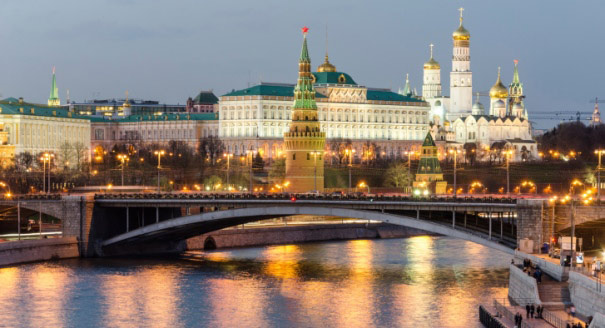The Ukraine crisis represents a fundamental turn in the West’s relations with Russia.
Even if the ceasefire that was agreed to in September between the presidents of Russia and Ukraine to stop the fighting in eastern Ukraine holds, there is no going back to business as usual with Russia.
The consensus among Russia watchers, inside and outside the country, is now so profoundly pessimistic and often cynical that whatever trust the West and Russia had established over the past several years is gone. In short, the West is losing Russia. But Europe may yet be able to salvage part of the relationship through civil-society exchanges.
Even though Russian President Vladimir Putin and his coterie of lieutenants have shrugged off the sanctions, the measures have dealt a psychological and political blow to Russia’s political elite—and prestige.
As a result, Russia has built up several narratives in reaction to the sanctions.
One narrative is that Western punitive measures are the best thing that could have happened to Russia because they are the catalyst for economic reform. This narrative, articulated at a roundtable in Vaduz on October 3–5 that focused on the relationship between Europe and Russia, claims that capital flight will end. Russians who have taken large sums out of the country will return with their money. The demographic crisis will end.
Russia, these observers say, will more than cope. And just to prove that, Russia can turn to China. In short, if the West believes it can isolate Russia, it is mistaken. Russia doesn’t need the West.
Another Russian narrative presented in Vaduz was more realistic but also very pessimistic. According to this line of thinking, Western sanctions will not spur reforms. On the contrary, Putin will exert even more state control over the economy.
Reforms, after all, would mean weakening the state, encouraging the rule of law, combating corruption, and establishing clear property rights. These Russia watchers say that Putin is not going to go down that road. These steps would undermine his own power base because they would involve the gradual democratization of Russia, which is precisely the process that Putin wanted to avoid in Ukraine.
There are other narratives in Russia that involve using the past to mobilize support for the present system. The most important account focuses on Putin’s fervent belief that the biggest tragedy besetting twentieth-century Russia was the collapse of the Soviet Union.
In the current conflict with Russia, the West too has its narratives. There are those who believe the West is shortsighted in ruling out force when it comes to dealing with Russia’s annexation of Crimea.
They argue that the former Serbian leader Slobodan Milošević capitulated in the spring of 1999 only after NATO finally decided to bomb Serb forces, which had been bent on ethnically cleansing Kosovo of Albanians. Until then, he ran rings around the West.
There are also those in the West who long supported Russia’s integration with Europe. They are now questioning how they can reverse Russia’s current course. These individuals are not “Russia sympathizers” such as Germany’s former chancellor Gerhard Schröder, who described Putin as an “impeccable democrat.” Instead, these observers believe that the political cost of losing Russia will be detrimental for Russia and for the West. The combustibility of the South Caucasus and parts of Eastern Europe—with Ukraine being a prime example—affects the interests of both.
Yet it is now difficult to even discuss shared interests between the West and Russia. Fewer and fewer Russian liberal intellectuals are speaking out. Fewer and fewer Russians are participating in debates in the West. This adds to the sense of isolation. That in turn reinforces the anti-Western propaganda meted out by Russian state media that the West has been unable to counter.
The West can react in a small way. Since a political dialogue is almost nonexistent between the West and Russia, Europe can do one thing. It can keep the door open to civil society and cultural exchanges, students and artists, writers, academics, and scientists in the faint hope of not losing Russia completely. And in the faint hope that one day Russia might change.





-2.png)

.png)
